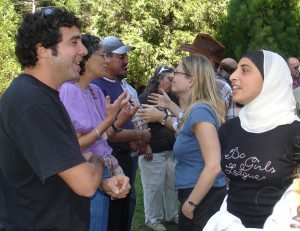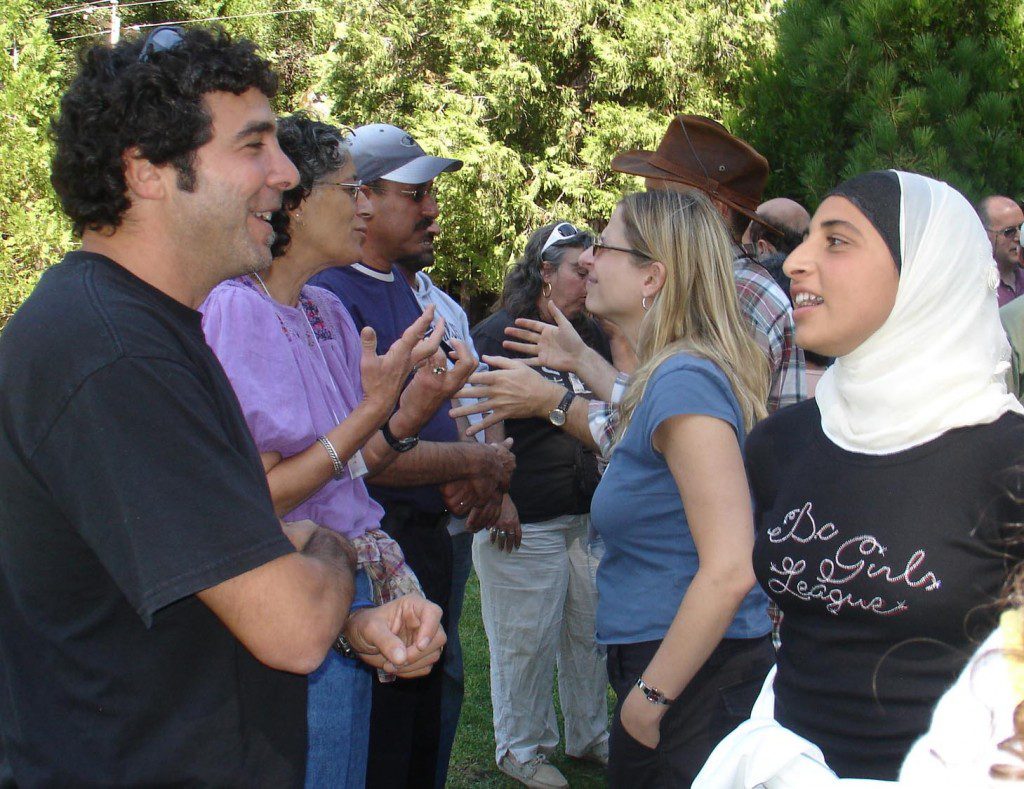 Guest Contributors Libby and Len Traubman discuss their vision for interconnectedness and how they’ve applied it in practice through dialogues in Nigeria and around the Israeli-Palestinian conflict.
Guest Contributors Libby and Len Traubman discuss their vision for interconnectedness and how they’ve applied it in practice through dialogues in Nigeria and around the Israeli-Palestinian conflict.
Ecstasy is In
It is our faith and experience after 46 years of marriage and peacebuilding that the soul’s oldest memory is of union, and the soul’s deepest longing is for reunion.
Seeking the ecstasy of reconnection—especially between enemies—is often disappointing for those clinging to the illusion of individual survival, and wanting peace but not face-to-face relationships.
Let’s face it, we and they are already in bed together, cohabitating the one side of our shared Earth. And big or small unresolved conflicts in bed will create walls and pain, not a new life worth living for.
Birthing life beyond war without relationships would be like conceiving a baby without the required sperm and egg, the needed opposites—expecting a miracle that isn’t going to happen.
Yet too many adversaries still disregard and avoid the feared-but-needed other, while remaining passive spectators of expert politicians and military personalities, analysts, strategists, and weaponry, en route to predictable catastrophe.
Neither technology nor distance can keep us safe. Only dependable relationships can do that.
Today’s sustainable security begins best with citizen-driven, skillful, face-to-face engagement. Marriage can come later, after social intercourse between artisans of communication joined at the heart and hip dignifying, not humiliating, each other.
Non-intercourse is out
Even peace education today can miss the point. An academic conflict transformation lecture or course— often not intercourse—frequently lacks a practicum or lab, field work, authentic experience that time-tests heart-to-heart human engagement skills with real-life Dialogue and its new quality of listening-to-learn. Beyond theorizing about it, today’s students deserve to experience that “an enemy is one whose story we have not heard.”
How but by perpetually meeting can we know how to replace today’s dehumanizing, normalized non-intercourse, fear, ignorance, and assumptions with the seeds and skills of familiarity, companionship, empathy, and problem-solving co-creativity—real ecstasy, a life worth living?
Peacebuilding: Choosing a life of making love
This life of helping people know each other in depth is for everyone, even us two garden-variety citizens. It requires only deep interest, moving toward people, dedication to the long-distance run, and deciding to export solutions—painting a living picture of life when love is the prevailing human function. And sharing how-to examples and tools for others.
Traveling in 1984 to the enemy Soviet Union to meet our Russian adversaries, we first realized that nothing replaces face-to-face relationships. They were gracious, cultured, generous, and inventive—easy to relate with, quickly and deeply. Stereotypes atrophied, as portrayed later in Deb Reich’s 2011 prophetic book, No More Enemies.
 Since 1992 our 21-year-old Jewish-Palestinian Living Room Dialogue in California, preparing for its 262nd meeting, has continued validating collective creativity and the supreme value of sustained intimacy leading to hundreds of examples of community, national, and global outreach events in this dearly-needed public peace process.
Since 1992 our 21-year-old Jewish-Palestinian Living Room Dialogue in California, preparing for its 262nd meeting, has continued validating collective creativity and the supreme value of sustained intimacy leading to hundreds of examples of community, national, and global outreach events in this dearly-needed public peace process.
In 1993 and for five years, the Dialogue created with Jewish Camp Tawonga the successful Palestinian-Jewish Family Peacemakers Camp near Yosemite National Park in California. Hundreds of Muslims, Christians, and Jews from 50 towns in Israel and Palestine experienced living together and communicating as they never had imagined. The impossible became possible, with a safe place, a little help, and courage. The resulting how-to film was PEACEMAKERS: Palestinians & Jews Together at Camp. Its DVD is in 70 nations on every continent.
“Let’s stop importing problems and begin exporting solutions,” was the prescription of Ken Kramarz, Camp Tawonga’s visionary director. Decades earlier E.F. Schumacher had advised us how to wisely use our energy not slaying the dinosaur but inventing the gazelle.
In 2010, more gazelles—and another instructional film—came from our facilitating 200 brave Muslims and Christians healing together in West Africa. Like other documentaries created from this handful of California relationship-builders, DIALOGUE IN NIGERIA: Muslims & Christians Creating Their Future now provides practical tools and living exemplars of the entry point to life beyond violence, including for reconciliation citizen-innovators in Cote d’Ivoire, DR Congo, and northern Nigeria.
Such human success stories are becoming the new “hard news.” They are the sexy prelude to a new wave of practical education and courses like Peace Journalism championed at the University of Sydney and Park University in Missouri. Story is the new power and teacher, because “people become the stories they hear and the stories they tell,” according to Professor Elie Wiesel.
These are the new facts of life—principles and daily practices of peacebuilding that are sowing among Mother Earth’s people seeds (and eggs) of hopefulness and lust for the ecstasy of communication and reunion.
After 46 years of marriage and three decades of helping adversaries to wed, it’s our experience that social intercourse is just right for living together in our diversity—partners forever.
– – –
Libby Traubman was a clinical social worker and Len a San Francisco pediatric dentist. They co-founded the Jewish-Palestinian Living Room Dialogue and co-produced six how-to films including in 2012 DIALOGUE IN NIGERIA: Muslims & Christians Creating Their Future. They have a daughter, son, and three grandchildren. The Traubmans live in San Mateo, California, USA, and receive e-mail at LTraubman@igc.org

